“People Want This Content”
Newspaper Experts Discuss Future of Journalism at Jam-Packed Wednesday Forum
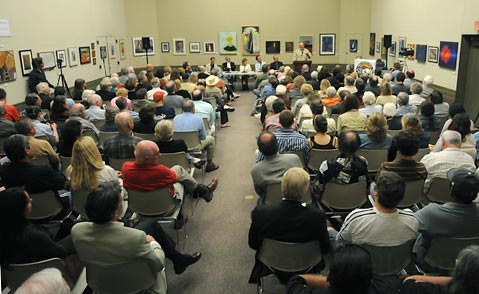
Reports of your newspaper’s death have been greatly exaggerated.
That was the overwhelming sentiment coming out of a journalism forum held at the Faulkner Gallery on Wednesday night in the Santa Barbara Public Library, in which five participants -namely, L.A.Times media reporter James Rainey, Chapman University professor and American Journalism Review contributor Susan Paterno, longtime newspaper editor and budding blogger Jerry Roberts, The Independent‘s executive editor and Angry Poodle columnist Nick Welsh, and retired UCSB sociology professor Dick Flacks – simultaneously admitted that it’s an uncertain era for the news biz while heralding many signs of innovation and hope. And based on the surprisingly strong turnout of more than 200 people at the standing-room only event, plenty of people in Santa Barbara aren’t ready to let traditional journalism’s investigative power and watchdog nature simply vanish into the Internet-shadowed night.
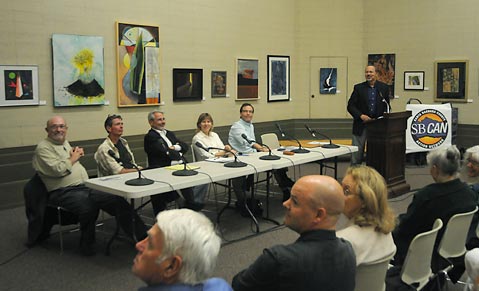
The 7 p.m. discussion began with introductions by blogger Craig Smith, who observed that a number of the people on stage had been affected by the meltdown of the Santa Barbara News-Press. Roberts, for instance, was personally sued by owner Wendy McCaw for breach of contract after he quit the paper and caused a mass exodus of employees in July 2006. Later, Paterno was also personally sued by McCaw for libel over an article she wrote for the American Journalism Review about the News-Press meltdown. And Welsh was the subject of a lawsuit filed by McCaw against The Independent over copyright infringement, again related to the July 2006 exodus. On top of that, the event was co-sponsored by the Teamsters, the union currently involved in labor negotiations with the News-Press and also suing through federal court to get a number of fired employees rehired by the paper.
Nonetheless, moderator Smith promised, “This is not a bash-the-News-Press session.” Despite the crowd’s vocal disappointment of that pledge, the bulk of the evening’s speakers complied, although it’s impossible to discuss the Santa Barbara media-scape without addressing aspects of the longtime daily paper’s demise.
James Rainey, Los Angeles Times
A reporter with more than 27 years on the job, Rainey admitted, “I don’t think anyone knows” what is going to happen with newspapers, but called the current situation – in which big city papers are closing or threatening to close in such places as Seattle, Detroit, Tucson, Denver, and Boston – a time of “radical, revolutionary change.” He recently attended federal hearings on the matter in Washington, D.C., and said that there was “not a thimble’s worth” of new information to tell of.
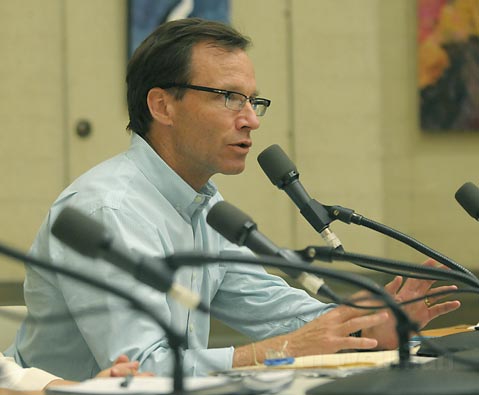
Despite claims that no one is reading newspapers, Rainey explained, “We’re doing quite well on the web.” Latimes.com, he said, gets eight to nine million unique viewers per month, a number that amounts to even more readers than in the paper’s glory, print-only days. “So people want this content,” he said.
The problem, however, revolves around what Rainey called the “new ugly word”: “monetize,” or how to make money off that content. In the old days, Rainey said his editors referred to the paper’s salespeople as “the ad goons.” But, he said, “We’re not like that anymore,” and now the paper’s editorial staff is in favor of creative advertising sales – such as wrapping it in glossy ads – or anything that brings money in the door. “At this point,” said Rainey, “frankly, if we can keep the lights on, pay the bills, and pay the reporters, you can wrap it in all you want.” Just a few years ago, full page ads at the L.A. Times sold for $75,000. Now, said Rainey, they sell for “pennies on the dollar.”
The online revenue models are still in the development phases, explained Rainey, but are nowhere near the big bucks that once came from print. Such models include charity projects, such as ProPublica; the micropayment proposal, in which people pay small amounts of money as they read online news; the sponsored content idea, where companies pay for certain articles to be done; and the pay-at-the-outset model, where fees for online news would be wrapped into cable or Internet service provider bills. The latter model would likely require an anti-trust exemption from the feds – since all papers would have to agree to the model at the same time – and Rainey doesn’t think that’s likely to happen.
So what is going to happen? “We’re gonna scramble wildly around like a chicken with our head cut off until we find some equilibrium,” said Rainey, who predicts “several years” of such scrambling. He pointed to the much celebrated online and nonprofit news agency Voice of San Diego, which has done a solid job of traditional reporting with solely an online platform. “That gives us some hope,” said Rainey.
Susan Paterno, Chapman University
Mostly silent since she “prevailed” in her libel case against McCaw, Paterno was asked to explain a little about her experience to the crowd by event organizer Melinda Burns, one of the former News-Press reporters who is fighting to get her job back. So Paterno prefaced her comments with the required legalese, explaining that what she was about to say was “fair comment” derived through the “lens of my experience,” hopefully blocking herself from further McCaw attacks.
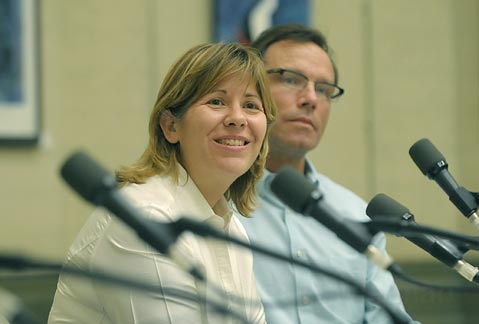
Calling McCaw a “bored billionaire” who “monopolized my time for two years,” Paterno said that the newspaper owner represented people who want to “hijack and subvert the First Amendment” for their own personal advantage. To do so, explained Paterno, McCaw and likeminded people take the First Amendment rights away from writers and reporters and place those rights solely on the shoulders of newspaper owners. In some ways, McCaw has been successful in this plight, so Paterno explained, “Although I won the lawsuit and the battle, she may have won the war.”
Specifically, Paterno referred to her legal fees, which exploded to more than $250,000 and, she soon discovered, were not going to be picked up by American Journalism Review‘s insurance company. When a “nitwit” Orange County judge – whose initial assessment of the case had to be rebuked by the Court of Appeals – only awarded Paterno half of her attorney’s fees, that left the magazine saddled with massive debt. “The future of the magazine remains murky,” she said.
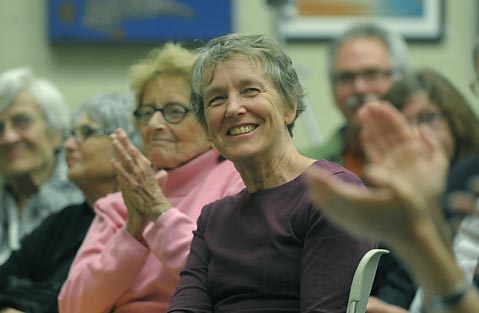
Aside from her unfortunate McCaw misadventure, Paterno proclaimed, “I believe there is much hope for the future of journalism.” She sees great innovation, explaining, “Around the world, citizen journalists are harnessing the power of the web for free expression.” She pointed to the use of the Internet in Iran’s ongoing uproar as a sign of good things to come. Ending her discussion with a mention of Horace Greeley’s famous quote to “Go West young man!”, Paterno encouraged the emerging generation of journalists to “take to the Internet highway with courage and consciousness.”
Jerry Roberts, Calbuzz.com
Pronouncing that he felt “like a brontosaurus delivering the keynote at an evolution convention,” Roberts, who formerly edited the San Francisco Chronicle and the News-Press, discussed his recent foray into full-fledged online journalism via the blog Calbuzz.com. “It’s so cool and so much fun and we’re having a great time,” he explained, detailing the ins and outs of the brand new world of online journalism, such as analytics, so-called “smart” advertisements, and instant feedback.
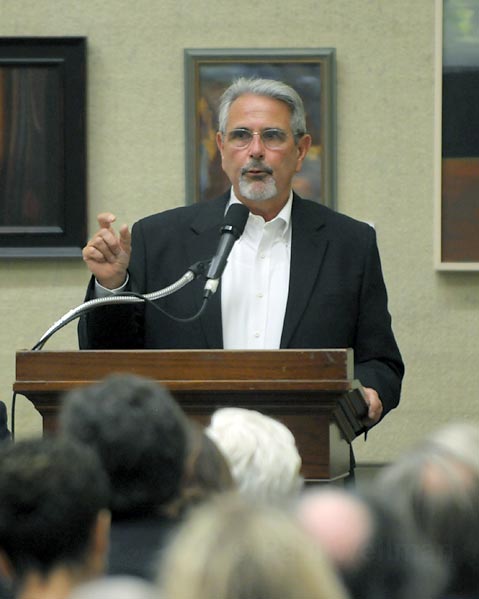
Roberts brought the journalism discussion back home, however, when he said, “Santa Barbara is a great case study of how much the media world is changing.” Due to the meltdown of the News-Press, the rest of the town’s media community had to step up and fill the void. Roberts had great praise for Independent.com, declaring, “That is the new media,” particularly in reference to this website’s coverage of the Jesusita and other wildfires. He also mentioned Noozhawk.com as a “great source of local news” and plugged Edhat.com as a “good example of aggregating sites.”
Taking a broader perspective on the whole news business, he said, “The biggest thing is that the business model is horribly broken.” Newspapers, especially big metro dailies, were developed to appeal to a large audience who had a vague interest in everything. “There isn’t a mass general interest audience out there anymore,” said Roberts, explaining that, due to the Internet, everything has become more niche-based. Because of that, he predicted, “In 10 years, we’re not going to have newspapers as such, except as maybe an elite product.”
Roberts is unclear what the long-term solution will be for reinvigorating revenues, but explained that, according to a recent poll, 75 million people now read newspapers online, which is 25 percent more newspaper readers than 20 years ago. Echoing Rainey, Roberts said, “People want the content.” He suggested that journalists should focus on the strengths of the online platform, which include immediacy, citizen participation, diversity of voices, and depth, and also advocated for schools to teach students how to wade through the Internet’s many sources to find the actual truth.
“At the end,” concluded Roberts, “the value of credibility is going to be what lasts.”
Nick Welsh, The Santa Barbara Independent
“It’s extremely exciting and it’s extremely scary,” said Welsh at the start of his talk, predicting that it will be four to five years before the future of the news business is really hashed out. But Welsh cautioned too much glorification of the past, explaining, “It’s grandiose for reporters to think that if they’re not around in their present configuration, the world will cease to spin on its axis.” He reminded the crowd that it was never perfect in the “good old days,” and that reporters have always failed to make the government and other powers-that-be fully accountable.
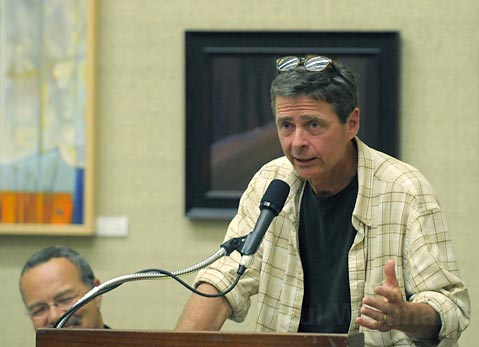
But Welsh’s biggest concern is very practical. “What’s going to sustain bodies?” he said, noting that while the rise of bloggers and citizen journalists is good, it takes money to pay for professional reporters to cover important issues week-in and week-out. Referring to such mundane yet important tasks as covering the school board, Welsh explained, “It doesn’t get more real than that. It doesn’t get more basic than that.” And that isn’t cheap. “It costs money to put an Ethan Stewart in the school board meeting,” said Welsh, naming The Independent‘s education reporter. “It costs money to put Chris Meagher in the county supervisors’ hearing:.What is going to sustain these bodies? We’re still navigating that.”
Welsh gave a nod to Wendy McCaw for making The Independent and the rest of Santa Barbara react to the changing tides of journalism before the real waves ever even crashed. “A day doesn’t go by when I don’t say ‘thank you, Wendy McCaw’,” said Welsh, who called Santa Barbara an “incredible petri dish” for “journalistic experimentation.” He explained, “Wendy has kicked us all in the ass and forced us to reexamine ourselves.”
Dick Flacks, UCSB
Taking a more sociological perspective on the matter, retired professor Flacks discussed the success of nonprofit entities such as National Public Radio and the Public Broadcasting System. He mentioned the recent announcement from the New York Times that the paper would be using content from ProPublica, the Center for Public Integrity, and the Center for Investigative Reporting, and asked, “Can we create something locally that can be parallel to that?”
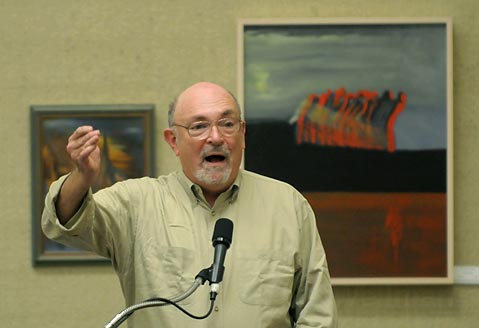
Citing Thomas Jefferson’s realization that the free flow of information is more valuable to democracy than perhaps the structure of government itself, Flacks challenged the crowd as he concluded, saying, “Let’s get engaged together here and online in making these things useful.”
The evening ended with a question and answer session.



